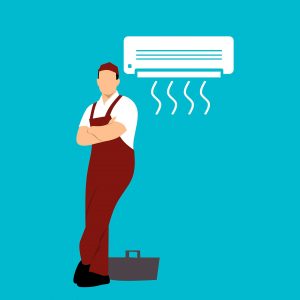 Summer temperatures cause the home’s HVAC unit to work overtime to cool the home. HVAC units often operate 24/7 during the summer, making maintenance extremely important to the health of the unit. The following summer AC maintenance tips from a local air conditioning company reduce breakdown and damage as well as the discomfort and expense that it brings.
Summer temperatures cause the home’s HVAC unit to work overtime to cool the home. HVAC units often operate 24/7 during the summer, making maintenance extremely important to the health of the unit. The following summer AC maintenance tips from a local air conditioning company reduce breakdown and damage as well as the discomfort and expense that it brings.
HVAC Maintenance Tune-Up
Generally conducted during the spring before the first day of summer, the HVAC maintenance tune-up keeps the unit in tip-top condition. A technician inspects, troubleshoots, and repairs components in the HVAC unit. This prevents breakdowns during the summer when the heat is oftentimes unbearable. Regular maintenance and tune-ups also prolong the life expectancy of the HVAC unit, maximizing value for homeowners.
Use a Ceiling Fan
A ceiling fan circulates cool air evenly throughout the home without running up energy consumption or costs. Turn on the ceiling fan and turn down the air conditioning unit by as many as four degrees. The room temperature stays the same, but the wear and tear on the HVAC unit lessens. This equals tremendous energy savings over the course of the year and reduces dependency on the HVAC unit. Install a ceiling fan if one is not available. The beauty, savings, and benefits are well-worth the small expense for the ceiling fan purchase.
*Fact: Room fans further circulate air through each room of the home, maximizing efficiency and savings.
Adjust the Thermostat
Adjust thermostat settings to accommodate the new schedule most families adhere to during the summer when school is out, kids are at home, and maybe even work schedules change. Summer changes include waking up later in the mornings, later bedtimes, sports, and activities that keep you away from the home. Consider the new family schedule and program the thermostat around the adjustments. Experts recommend adjustments of 6+ degrees to maximize efficiency.
*Fact: The Department of Energy estimates an average savings of 1% for each degree above 68 degrees per eight hours.
Improve Airflow
Good airflow spreads cool air and comfort throughout the living areas and sustains a well-functioning HVAC system. Improve airflow in the following ways:
- Change the Filter: Change the air filter monthly or once every three months maximum. Debris and dirt accumulate in the unit faster in the spring and summer because the system works constantly. Filters cost a few dollars at home improvement stores. Consider using a MERV filter for better contamination control and reduced allergies.
- Clean the Exterior Unit: Clean the outside condenser unit often. Experts recommend cleaning during lawn maintenance and/or grass cutting. Grass, leaves, sticks and mulch, and other debris accumulate on the condenser unit, causing a blockage that prevents heat/air from exiting the system. Use a cleaning brush to wipe debris away.
- Clear the Exterior Area: While cleaning the condenser unit, clear the area around it. There should be no plants, roots, or debris within a two-foot space of the condenser unit. Pull all vegetation around the unit to prevent airflow restrictions.
- Inspect the House: Walk through the home, inspecting vents and registers. Make sure each is open and unblocked. Never set the louvers to the closed position, even in uninsured areas. Move furniture, rugs, and other items away from grilles and vents to allow proper air circulation through the ducts into the home.
Consider Window Treatments
Especially in the late afternoon, sun shines into the home through the windows, quickly heating up the place. Quality window treatments reduce the sun that penetrates through the glass, so the air conditioner does not work so hard to cool the place down during the afternoon heat.
Install a Whole House Dehumidifier
Indoor dehumidifiers remove excess moisture from the air by pulling it out of the HVAC system as air cycles through. Excessively high humidity levels prevent air conditioning units from completing this task efficiently. Tackle the problem with humidity by installing a whole-house dehumidifier. Prefer a more affordable choice? Portable dehumidifiers might be a good choice.
Seal it Up
Windows and doors that are not properly sealed may leak air to the outside of the home. A/C units must compensate for the lost air to keep the home at the chosen temperature. The pumps and other components work double time to cool the home at that time. Inspect the windows, doors, and other areas of the home that may allow air to escape and seal them up. Insulation, weather-stripping, and caulking all seal up gaps in windows and doors, preventing this common summertime problem.
Call an HVAC Repairman
Sometimes despite the best efforts, a homeowner puts forth, HVAC breakdowns and mishaps occur. They occur at the worst possible times, when temperatures are at their hottest, so it seems. Do not delay repair when incidents happen. Fast response from a professional HVAC repair team reduces damage and wear and tear to the unit. Fast repairs also cost considerably less since there is less work for professionals.
*Fact: The average A/C repair cost ranges from $125- $800. The severity of the damage, A/C brand/type, and other factors impact the final cost.